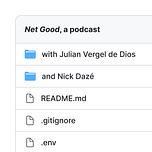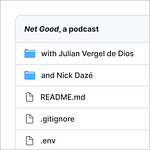What happens when infinitely replicable code collides with economic systems built for scarcity? Nick and Julian tackle the uncomfortable question: Is capitalism fundamentally incompatible with software?
Starting with a simple thought experiment about stealing cars versus copying code, the conversation unpacks how software’s unique physics—zero marginal cost, infinite replicability, and decoupling from physical scarcity—breaks the mental models that underpin capitalist economics. From Netflix’s DRM workarounds to Wikipedia’s invisible contribution to GDP, they explore why our existing frameworks struggle to measure or incentivize the abundance that software creates.
The episode doesn’t offer easy answers. Instead, it surfaces deeper questions about platform ownership, value measurement, and whether we’re stuck in an unstable equilibrium between old and new economic realities.
Key Topics & Timestamps
Defining Capitalism (00:00-05:30)
Private ownership and control of means of production
Market-based resource allocation
Price as information signal (Hayek)
Profit motive and capital accumulation
Legal frameworks for property and contracts
Software’s “Code Smell” Problem (05:30-12:00)
Introduction to “code smells” as heuristics in software development
DRM (Digital Rights Management) as symptom of deeper incompatibility
Why software breaks traditional property models:
Infinite replicability at near-zero marginal cost
Non-rivalrous consumption (copying ≠ theft in traditional sense)
No natural scarcity
The Netflix Paradox (12:00-18:00)
How streaming services artificially create scarcity
The technical absurdity of DRM: downloaded content that artificially self-destructs
Why companies must spend resources to *prevent* abundance
The contradiction of paying to make your product worse
Marginal Cost and Market Failure (18:00-25:00)
Traditional economics: price approaches marginal cost in competitive markets
Software’s marginal cost: effectively zero
**The problem**: Zero-price equilibrium means creators can’t recoup R&D costs
Why this breaks the incentive structure of capitalism
First-mover advantage as temporary solution (but unsustainable)
The Wikipedia Case Study (25:00-30:00)
From thousand-dollar encyclopedia sets to free, universal access
The measurement problem: billion-dollar industry → zero → looks like value destruction
Reality: Massively increased access, frequency, and utility
Question: Are we systematically under-counting software’s contribution to GDP and productivity?
Platform Power & Feudal Futures (30:00-35:00)
The “one foot in old world, one foot in new” instability
Risk of neo-feudalism: Platform owners control entire stack, everyone else rents
Why this feels wrong but lacks obvious solutions within capitalist framework
Star Trek economics as thought experiment (post-scarcity, post-money)
Beyond the Binary (35:00-38:00)
Rejecting the capitalism-communism spectrum as the only option
Call for more creative thinking about economic systems
Acknowledgment that we’re pattern-matching to old models when we need new ones
Hot Take: AI Isn’t Software (38:00-End)
Julian’s provocation: Current generative AI is fundamentally different from software
Unlike true software, AI is tightly coupled to hardware economics
Suggests AI might be a new species of thing—neither pure software nor hardware
Key Insights
On Software’s Unique Physics:
“If I steal your car, you don’t have a car anymore. If I steal your code base though, you’ve still got a code base, but we would still call that theft. So what does that tell us about the ways that the physics of software break our understanding and mental model of capitalism?”
On Artificial Scarcity:
“The software is good enough to do what you want it to do, but then you have to pay people to make it not do something that it could otherwise easily do. That’s broken. That’s a broken incentive structure.”
On the Measurement Problem:
“The deflationary pressure [of software] is so strong in a way that could create such abundance and could create such high quality of life, but that’s so difficult to measure, it breaks all of our instrumentation.”
On Platform Feudalism:
“I’m worried the new world looks like medieval France where a few platform owners and their shareholders own the entire stack of our civilization and we all just are visitors here. We’re all renting everything and that feels wrong.”
On Economic Creativity:
“There has to be more creative things we can come up with for economic systems than just that one spectrum [capitalism to communism]. There has to be something else.”
---
## Concepts Explained
**Code Smell**: A heuristic in software engineering indicating structural problems. Examples include functions that are too long or logic that’s copy-pasted across multiple locations. Suggests future maintainability issues even when code currently works.
**Digital Rights Management (DRM)**: Technologies designed to control how digital content can be used after purchase. The hosts argue DRM represents an artificial constraint imposed to maintain scarcity-based business models despite software’s natural abundance.
**Marginal Cost**: The cost of producing one additional unit. In traditional manufacturing, this includes materials and labor. For software, marginal cost approaches zero after initial development, creating fundamental problems for price-based markets.
**Zero-Sum vs. Non-Zero-Sum**: Traditional physical goods are zero-sum (if you have the bicycle, I don’t). Software is non-zero-sum (we can both have copies of the same program without diminishing each other’s copy).
**Externalities**: Economic side effects not captured in market prices. The hosts suggest software creates massive positive externalities (like Wikipedia) that are invisible to GDP measurements.
Related Concepts to Explore
Information wants to be free (Stewart Brand)
The abundance vs. scarcity dichotomy in digital goods
Open source economics and sustainability
Universal Basic Income as response to automation
Public goods and the free rider problem
The tragedy of the commons (and anti-commons)
Platform capitalism and network effects
Post-scarcity economics
The knowledge economy and intangible assets
Recommended Reading & References
Snow Crash by Neal Stephenson (mentioned: dystopian hyper-capitalist future)
Friedrich Hayek’s work on price signals and information
Marc Andreessen’s “Software is Eating the World”
Chris Anderson’s “Free: The Future of a Radical Price”
About Net Good
Startup life is messy. Founders Julian Vergel de Dios and Nick Dazé share candid stories about building technology. From emerging trends and tech predictions to personal failures and philosophy, Net Good explores how entrepreneurship works.



